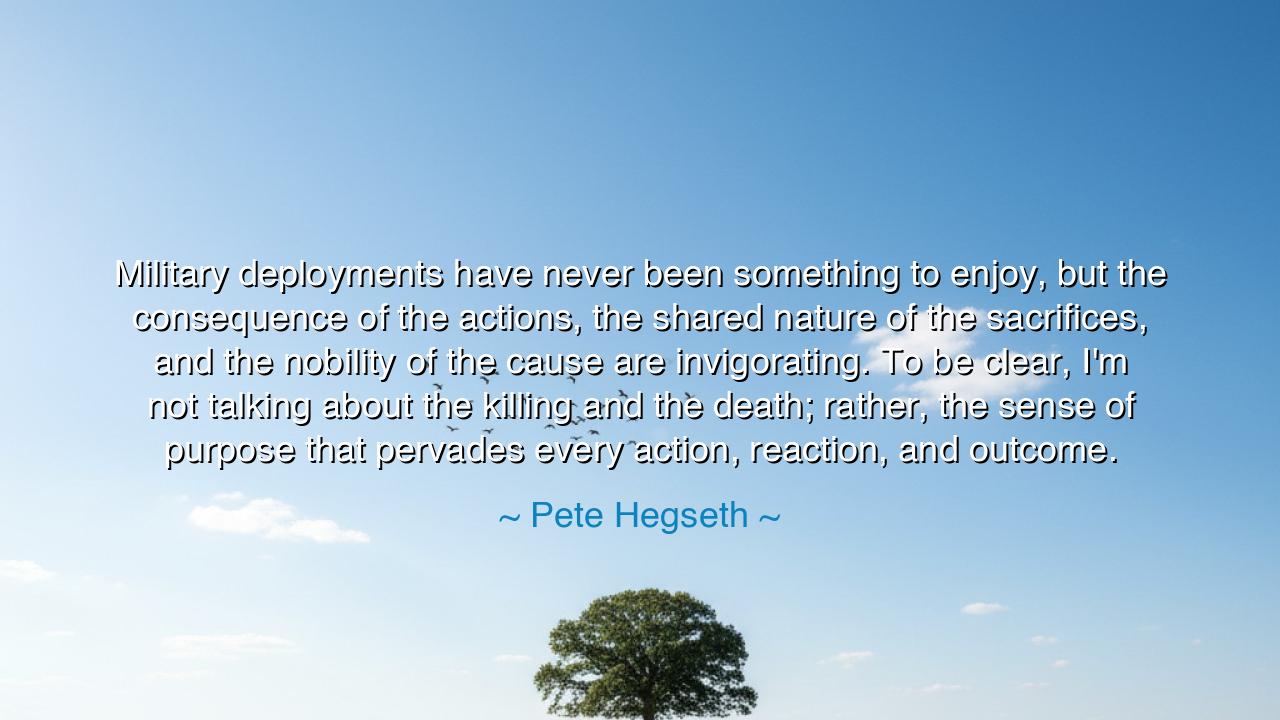
Military deployments have never been something to enjoy, but the
Military deployments have never been something to enjoy, but the consequence of the actions, the shared nature of the sacrifices, and the nobility of the cause are invigorating. To be clear, I'm not talking about the killing and the death; rather, the sense of purpose that pervades every action, reaction, and outcome.






In the words of Pete Hegseth, “Military deployments have never been something to enjoy, but the consequence of the actions, the shared nature of the sacrifices, and the nobility of the cause are invigorating. To be clear, I’m not talking about the killing and the death; rather, the sense of purpose that pervades every action, reaction, and outcome,” we hear the voice of one who has stood in the fire and come away tempered, not hardened. These words carry the wisdom of the warrior’s heart—a heart that knows both suffering and honor, both despair and meaning. They speak not of battle as glory, but of duty as transcendence. In them lives the ancient truth: that while war itself is never beautiful, the courage it calls forth in men and women can illuminate the darkest night.
The meaning of this quote lies not in the thrill of conflict, but in the profound sense of purpose that arises when human beings unite under a cause greater than themselves. Hegseth’s reflection separates the brutality of war—the killing, the loss—from the deeper current that runs beneath it: brotherhood, service, and sacrifice. For in every act of endurance, every moment of fear faced together, there is born a kind of purity—an unspoken understanding that one’s life is no longer lived solely for oneself. This is the fire that refines the warrior spirit, and it is this fire that Hegseth calls invigorating.
The ancients understood this paradox well. In the tale of Leonidas and his three hundred Spartans, we see not men lusting for battle, but men bound by honor and unity, standing at Thermopylae not for conquest, but for the preservation of their people’s freedom. They knew that their bodies would fall, but their courage would endure. And when they fought, they did not do so with joy for bloodshed, but with clarity of purpose. Hegseth’s words echo this same truth—that the nobility of sacrifice does not lie in destruction, but in devotion; not in taking life, but in offering one’s own for something eternal.
To speak of shared sacrifice is to speak of one of the most sacred bonds known to humankind. Those who have marched together through danger understand that in such moments, all illusions of pride and self-interest fade away. Each breath becomes a gift earned by the trust of the one beside you. That unity—the merging of many souls into one purpose—is what gives even the bleakest mission its light. The ancient Romans called this virtus, the manly virtue of courage joined with loyalty, born from hardship and service. Hegseth’s reflection stands as a modern hymn to that same virtus, found not in the celebration of war, but in the endurance of its trials with grace and meaning.
It is also a meditation on the human need for purpose. For even in times of peace, many drift aimlessly, seeking fulfillment in pleasure or comfort, and find none. But those who have faced the abyss with a mission in their hearts know something different—they have tasted the power of living with intention. That same sense of purpose can be found beyond the battlefield: in a mother’s tireless care for her children, in a teacher’s dedication to truth, in every act where one gives without counting the cost. The warrior’s lesson is not confined to war—it is a guide for all who wish to live fully, consciously, and courageously.
We must, however, heed the humility in Hegseth’s words. He is careful to say, “I’m not talking about the killing and the death.” This distinction is vital, for it reminds us that true honor never delights in destruction. The nobility of the cause lies not in violence, but in service. The tragedy of battle should awaken compassion, not pride. And so the wise must hold both truths in their hands: that purpose gives life meaning, and that meaning must always serve peace, not pride. Even the greatest warrior must one day lay down his sword and teach others to build rather than destroy.
So let this be the lesson for those who seek wisdom from these words: do not look for joy in struggle, but find meaning within it. Seek not to avoid hardship, but to transform it into purpose. Live as the soldier lives in spirit—disciplined, united, and steadfast in your calling. Whatever your battlefield—be it in war, work, or the quiet struggles of the heart—carry yourself with the same resolve that Hegseth describes: to act not for glory, but for something higher than yourself.
For in the end, this is what the ancients taught and what every noble soul discovers—that the true battle is not against others, but within, and victory comes not through triumph, but through purpose, sacrifice, and the peace of knowing you have served something eternal.






AAdministratorAdministrator
Welcome, honored guests. Please leave a comment, we will respond soon